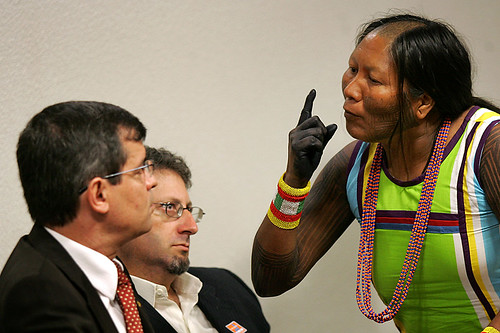
Tuira Kayapo, leader of the indigenous Kayapo tribe, speaks to Aloysio Guapindaia,
director of the National Indian Foundation, FUNAI. (AP Photo/Eraldo Peres)
Yes, indeed! It's a squirmy deal at best, put together hastily in the final moments before a politically insane auction during global Earth Week celebrations.
International Rivers, the global NGO that has filled a key role in disseminating the truth about Belo Monte gives the latest UPDATE
Belo Monte Dam is by no means an inevitability, despite what the Brazilian government and the companies promoting the dam would like you to believe. Legal actions, protests and occupations by indigenous groups, and a growing international campaign could derail the project. Let's recap the events of the last couple of weeks.
After several last-minute legal wranglings, the auction went forward on April 20, 2010, and the dam contract was awarded to a consortium calling itself Norte Energia (North Energy), led by CHESF, an Electrobras subsidiary. The consortium bid to supply power to the grid at a cost of R$77.97 per MWh, well below the government-set price ceiling of R$83 per MWh, a low price which was already scaring away investment. Very soon after the auction, two companies threatened to pull out of the consortium, citing lack of profitability. The consortium itself is in a state of disarray, with some companies pulling out and others from the losing consortium potentially joining in.
Indeed, the lack of economic viability of the project has been an ongoing theme the past couple of weeks. Brazil's pre-eminent national newspaper, O Globo, published an editorial on April 20 entitled "Belo Monte is a bad investment for Brazil". O Globo cites the fact that the winners of the auction will get an unprecedented 30-year loan from BNDES, the Brazilian National Development Bank, with an interest rate of just 4%, less than what the government will be selling bonds for to finance the deal! Because of the lack of private investment, to finance the loan BNDES is drawing from the Workers' Support Fund (Fundo de Amparo ao Trabalhador) and from public pension funds- funds that are supposed to guarantee job security, health, and education provisions, not subsidize the energy consumption of electro-intensive industries! In addition, the government announced tax breaks of 75% for investors in the auction, while around half of the shares in the project will be owned by state-owned enterprises, which generally operate with a minimal return on investment.
Next, a former director of ANEEL, the national electrical regulatory agency, said on April 27 that the government would be "creating a monster" if they go ahead with Belo Monte. Besides the social and environmental problems, the project would threaten energy security because of the large seasonal variations in power production (the dam is expected to generate as little as 1000 MW during the dry season). Afonso Henriques Moreira Santos said that "Belo Monte is not essential for energy security." Indeed he argued that dams in the Amazon are not a good solution for Brazil's energy needs because of the long transmission lines that need to be built to bring the energy to population centers. "Large transmission lines are very fragile," he said.
And as if to reinforce the point that this is a lousy investment for Brazilians, José Ailton de Lima, the president of the winning consortium Norte Energia, said the final price of the project will be somewhere between R$19 billion (US$10.85 billion) and R$30 billion (US$17.13 billion). The higher price is what private construction contractors have thought it will actually cost all along. Such skyrocketing costs can only be absorbed by the huge public subsidies being offered by the government.
Meanwhile, opposition is mounting internally and externally. In Brazil, the Senate is investigating claims that ANEEL held the project auction illegally by ignoring a third restraining order placed on the auction by federal Judge Antonio Carlos Campelo. Reports show that the third order to cancel the auction was issued by 1pm, yet the auction still went forward at 1:20pm behind closed doors. A regional appellate judge overturned the third order, buckling to direct pressure from the government. By pushing Belo Monte through at any cost, the Lula government is making a mockery of Brazil's rule of law.
Abroad, the auction date was marked by massive protests around Brazil and people calling in to Embassies around the world to express their opposition to the project. Soon after, indigenous people from the Big Bend of the Xingu announced that they would be establishing a protest village on Pimental Island, the site where dam construction will take place, in order to block construction. They are planning this village as I write.
In solidarity, the Kayapo Indians from the Xingu National Park have been blocking a major road and river crossing in Mato Grosso state for the past week to protest the government's decision to build the dam. Kayapo leader Megaron Txukarramae released a statement reaffirming his people's intention to resist dam construction, calling President Lula "enemy number one", and stating that "if Lula wants to do away with us as he has been indicating, the whole world will know that we will die fighting for our rights." Heavy words from a warrior tribe.
And just last Wednesday our friends at Amazon Watch organized a protest in front of the Brazilian mission to the United Nations in New York with indigenous people around the world and actress Sigourney Weaver to express opposition to Belo Monte Dam.
Legal actions, protests, a mounting campaign: it ain't over until the fat lady sings, and that fat lady will not be singing for a while.
No comments:
Post a Comment